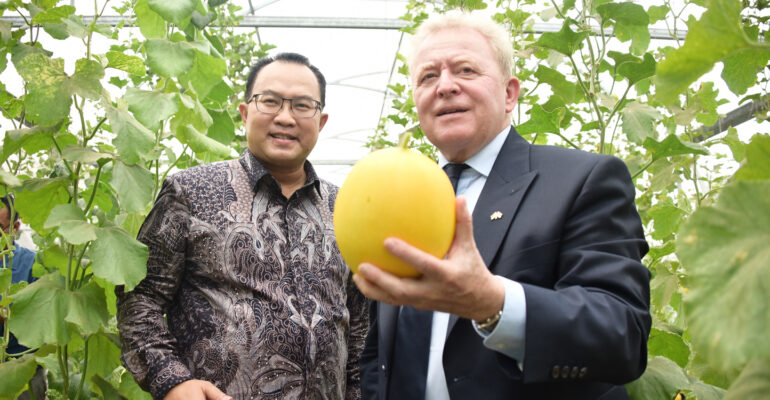EU Commissioner for Agriculture Visit to IPB University, Discussing Sustainable Agriculture Policy and Strategy

IPB University received a visit from the European Union (EU) Commissioner for Agriculture and his delegation. In his visit to the Campus of IPB Dramaga, Bogor (29/10), it was discussed the policies and strategies of the European Union in developing sustainable agriculture which has an impact on the future of food supply globally, including in Indonesia.
Rector of IPB University, Prof Arif Satria at the meeting said, IPB University has a vision to become a techno-socio entrepreneurial university. He believes that innovation is the key to the development of the nation.
“To produce potential innovations, a strong research program is needed. Therefore, research activities are key in developing innovation,” he said.
Prof Arif hopes that this meeting will give a good impression of IPB University’s commitment to the techno-socio entrepreneurial ecosystem and sustainable agriculture.
“We look forward to fruitful discussions and strengthening our joint commitment to the development of sustainable agriculture through cooperation with your institution,” he said.
Vice Rector of IPB University for Global Connectivity, Collaboration, and Alumni Relations, Prof Iskandar Z Siregar said, IPB University continues to encourage multi-institutional and cross-disciplinary collaboration with active involvement in 73 international consortia covering research and education.
“Currently, IPB University has also collaborated with 92 institutions in Europe,” he explained.
Prof Iskandar explained that IPB University is committed to building an ecosystem to achieve the vision with two main pillars, namely Science and Technology Park (STP) and Community Learning Center (CLC).
“Through STP and CLC, research and innovation are linked to industry and markets, and we implement programs to empower the community, especially farmers, fishermen, and rural communities,” he said.
European Union Commissioner for Agriculture, Janusz Wojciechowski said, in the European Union, there has been a reform of the Common Agricultural Policy (CAP) with the aim of strengthening the sustainability, productivity, and resilience of the agricultural sector.
“Under this policy, each EU member state can design a national strategic plan to achieve these common goals,” he said.
Wojciechowski continued that from 2009 to 2022, retail sales of organic products in the EU increased by 150 percent.
According to him, promotional campaigns also play an important role in this. Such measures have increased customer engagement by almost 40 percent over the past 10 years through the introduction of the EU organic logo.
“I encourage Indonesia to explore the potential of organic products, as we have seen in Europe that organic farming is profitable. Organic techniques and organic supply chains often provide fairness and decent profits for all parties,” he said. (dr/Rz) (IAAS/Aly)



